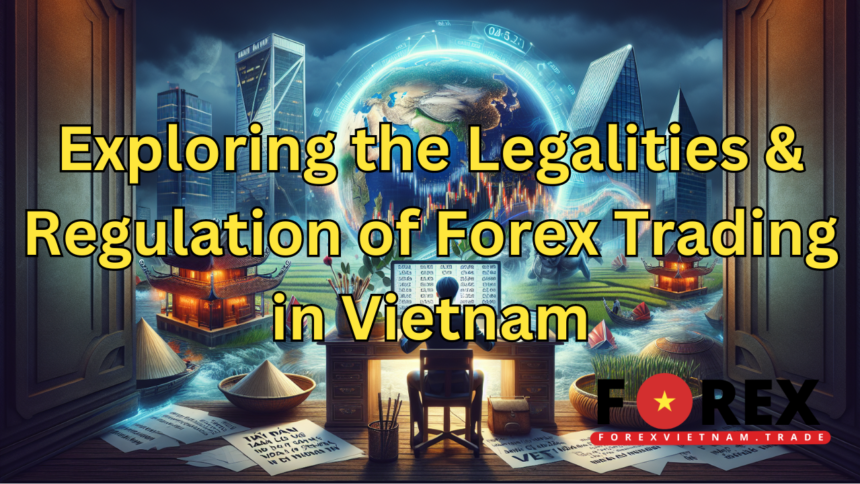Forex trading, or foreign exchange trading, involves buying and selling currencies on the global market, making it one of the largest and most liquid financial markets in the world. While it offers opportunities for substantial profits, it also comes with significant risks, especially in terms of legal and regulatory compliance. In Vietnam, where financial markets have been gradually opening up, understanding the legal landscape of forex trading is crucial for both local and international traders.
1. The Regulatory Framework in Vietnam
Vietnam’s approach to forex trading is relatively cautious, reflecting the country’s broader economic and financial policies. The State Bank of Vietnam (SBV) is the central authority that regulates all banking and financial activities, including forex trading. The SBV has implemented several regulations to control and monitor foreign exchange activities to maintain economic stability.
In Vietnam, forex trading by individuals and unlicensed entities is generally prohibited. The SBV strictly controls the foreign exchange market, and only authorized financial institutions, such as banks and licensed financial companies, are permitted to engage in forex trading activities. These institutions are required to adhere to the guidelines set by the SBV, which include reporting requirements, risk management protocols, and limits on foreign exchange positions.
2. Retail Forex Trading: Restrictions and Challenges
Retail forex trading, which refers to individual traders buying and selling currencies for personal gain, is highly restricted in Vietnam. The SBV’s regulations do not permit individual investors to trade forex directly on international platforms. This restriction is part of a broader effort to prevent potential financial instability and protect inexperienced investors from the high risks associated with forex trading.
Despite these regulations, some Vietnamese traders still participate in forex trading through offshore brokers. These brokers often operate outside the jurisdiction of Vietnamese law, which poses significant risks to traders. Without the protection of local regulations, Vietnamese traders may face difficulties in resolving disputes or recovering funds in cases of fraud or broker insolvency.
3. Legal Implications for Unauthorized Forex Trading
Engaging in unauthorized forex trading activities in Vietnam can lead to legal consequences. The Vietnamese government has taken a firm stance against illegal forex trading, with penalties that include fines, the confiscation of assets, and in severe cases, criminal charges. The authorities have also been known to crack down on unlicensed brokers operating within the country, aiming to protect consumers from fraudulent schemes and financial losses.
For individual traders, the risks are not just financial but also legal. Participating in unauthorized forex trading can result in fines and other penalties, making it essential for traders to understand the legal framework before engaging in such activities.
4. Licensed Forex Trading and Opportunities for Institutional Investors
While retail forex trading is restricted, there are opportunities for institutional investors and corporations to engage in forex trading legally. Banks, financial institutions, and large corporations that engage in international business often need to trade currencies as part of their operations. These entities are allowed to conduct forex transactions under the supervision and regulation of the SBV.
Institutional forex trading is subject to stringent controls, including mandatory reporting, limits on positions, and adherence to anti-money laundering (AML) and counter-terrorism financing (CTF) regulations. These measures are designed to ensure transparency, prevent market manipulation, and protect the integrity of Vietnam’s financial system.
5. The Future of Forex Trading Regulation in Vietnam
As Vietnam continues to integrate into the global economy, there is ongoing discussion about the potential relaxation of forex trading regulations. The country’s financial markets are gradually opening up, and there is growing interest in expanding access to forex trading, particularly for experienced investors and institutional players.
However, any future changes are likely to be implemented cautiously. The SBV’s priority remains maintaining economic stability and protecting consumers. Therefore, while the regulatory environment may evolve, it is unlikely to see a rapid or significant liberalization of forex trading laws in the near term.
6. Navigating the Legal Landscape: Tips for Traders
For those interested in forex trading in Vietnam, it is crucial to stay informed about the legal and regulatory environment. Here are some tips for navigating the legalities of forex trading in the country:
- Consult Legal Experts: Before engaging in forex trading, it is advisable to consult with legal experts or financial advisors who are knowledgeable about Vietnam’s regulatory framework.
- Use Licensed Institutions: Engage in forex trading through licensed financial institutions that comply with SBV regulations. This ensures a higher level of security and legal protection.
- Be Cautious with Offshore Brokers: If considering trading through an offshore broker, thoroughly research the broker’s reputation, regulatory status, and the potential legal risks involved.
- Stay Updated: Forex trading regulations can change, so it is important to stay updated on any new laws or regulatory developments that could impact your trading activities.
Conclusion: Understanding the Complexities of Forex Trading in Vietnam
Forex trading in Vietnam is a complex and tightly regulated activity. While the opportunities for retail traders are limited due to strict regulations, institutional investors can engage in forex transactions under controlled conditions. Understanding the legal framework is essential for anyone looking to participate in the forex market in Vietnam, as the risks of non-compliance can be significant.
As Vietnam’s financial markets continue to develop, the regulatory environment may gradually evolve, offering more opportunities for both local and international traders. However, for now, adherence to existing regulations is crucial for ensuring legal and financial security in forex trading.







